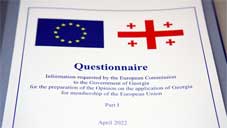
Georgia to Submit Second Part of EU Accession Questionnaire Ahead of Schedule
By Khatia Bzhalava
Wednesday, May 4, 2022
The EU Ambassador to Georgia Carl Hartzell announced yesterday that it is expected the European Commission to prepare its opinion for the EU candidate status of Georgia, Ukraine, and Moldova sometime next month. He also stressed that the assessment on the candidate status would be made based on the situation on the ground, including Georgia’s adherence to fundamental EU values, and key economic and other criteria.
On Monday, Prime Minister Irakli Garibashvili handed over the first completed part of the EU membership questionnaire to Hartzell, calling the development a ‘paramount stage’ in the EU integration process. Hartzell told Georgian media yesterday that he was honored to receive the first answers to the first questionnaire and was confident the Georgian Government would deliver the second completed part of the country’s membership questionnaire soon.
Georgian Foreign Minister Ilia Darchiashvili announced yesterday that Georgia would submit the second part of the questionnaire before the deadline, hoping the process to be successful. According to him, filling out the questionnaire was a responsible and time-consuming process, involving all government agencies on the instructions of the Prime Minister.
“We continue to work on the second part of the questionnaire, which is quite voluminous and sectoral in content. We plan to submit it to the EU promptly and early,” Darchiashvili said.
The second part of Georgia’s EU membership questionnaire, which is a 239-page-long document, divided into 33 chapters with about 2,300 questions, focuses on the compatibility of Georgia’s specific legislative frameworks for each sector of the national economy with that of the EU. The topics covered by the questionnaire range from existing legislation on work permits and the freedom of movement of workers to anti-discriminatory laws.
The document touches upon the existing banking and non-cash payment systems in the country, and whether there are effective laws in force to prevent money laundering and the funding of illegal activities. The questions also focus on Georgia’s intellectual property laws and the extent of copyright laws regarding computer applications and technology as well.


